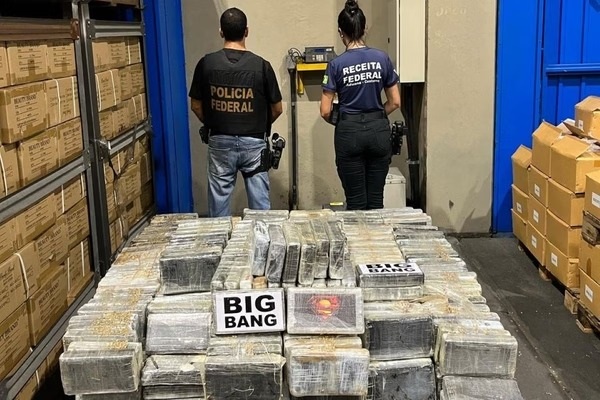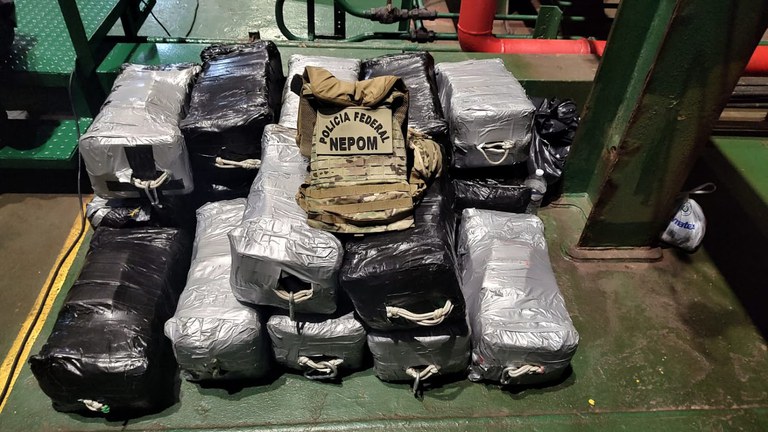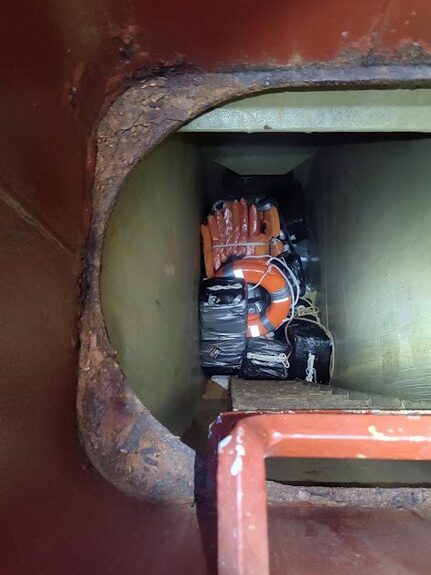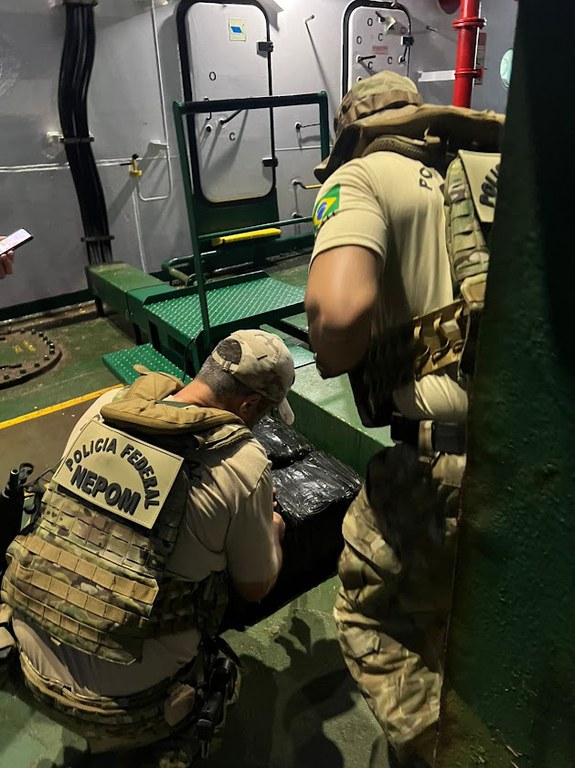
Increase in cocaine seizures in Brazil
read more

Police seized half a tonne of cocaine from a bulk carrier in the anchorage of Itaqui as it waited in line to load soya beans for Spain
Last week, the Federal Police recovered a staggering 500 kilograms of cocaine hydrochloride from a Polish-operated bulker near the Port of Itaqui in São Luís, capital of Maranhão. The Bahamian-flagged vessel arrived in ballast from Rotterdam and was anchored off Itaqui, waiting to enter the port to load soya beans for Cartagena in Spain.
In a press release, the police reported that they aborded the ship at the Itaqui anchorage, where they interviewed the crew and retrieved packages with the illicit narcotic from within the vessel. Police did not disclose the actual location of the drug stash but released a few pictures. The drug was packed in sports bags with waterproof wrapping, rigged with carabiners and shackles to pull and tow packages.



Media reports stated that the crew discovered the drug packages in a compartment at the forward of the ship and called the police through the agents. The crew suggested that the perpetrators may have approached from a small boat at night and concealed the drug on board the vessel while they were asleep. Police suspect that the cocaine was brought in with crew assistance and will question them as part of the ongoing criminal investigations. The seized drug has now been incinerated.
According to the police, this was the largest amount of cocaine ever seized in Maranhão, on Brazil’s northeast coast. The port of Itaqui, adjacent to the Ponta da Madeira iron ore terminal, is a major hub for imports of oil products other than crude. It stands as the third-largest soya bean exporting port complex in the country and ranks second only to Santos in maize (corn) exports.
The recent incident in Itaqui serves as a fresh reminder to shipowners and crews calling at Brazilian ports that there is no such thing as a port free from the risk of drug contamination. While southern ports such as Santos, Paranaguá, and Rio de Janeiro certainly stand out when it comes to shipborne cocaine trafficking, other ports up the coast and in the Amazon waterways are equally susceptible to the drug threat.
Indeed, even though the majority of drug-related incidents and seizures have occurred in the busy southern ports, the largest quantity of drugs ever seized in a single port incident has happened in the small riverport of Vila do Conde, near Belém, on the eastern Amazon. A task force seized nearly three tonnes of cocaine hidden in a container destined for Sines, Portugal, after sniffer dogs detected it. Just last month, 39 kg of cocaine was seized in this same port from a livestock carrier loading oxen in the public port of Vila do Conde.
Drug traffickers are highly adaptable and resourceful, often outmanoeuvring law enforcement efforts. Sophisticated criminal organisations can quickly adapt their methods and displace usual trafficking routes, even if only temporarily. They rely on a wide range of secondary departure points, including Northern Arc ports, to evade detection. The drugs may be concealed inside or under the ship, with or without the knowledge or participation of the crew. Depending on how the drugs are hidden and discovered, the crew may face criminal consequences. There may also be commercial losses to the shipowners in the form of delays, loss of hire, legal expenses, and, ultimately, reputational damage.
Recent incidents of cocaine seizures from shipping containers and bulk carriers (on deck, in cargo spaces and inside sea chests), as well as the latest European statistics on interceptions of illegal shipments from Brazil, indicate that the drug threat is present and remains high. Ship operators and crews should, therefore, consider all Brazilian ports as potentially at risk of drug contamination. They should strictly adhere to the ship security plan (SSP) and stay vigilant while at anchor, alongside, during cargo operations, and prior to departure. Criminal groups consider the apparent level of security displayed by the profiled vessel as a critical selective factor, in addition to its size, type, and destination. The more robust the ship security arrangements appear, the less likely it is to be targeted for drug smuggling.
This guide provides practical information on Brazil’s legal framework for illicit drugs, port and ship security, law enforcement arrangements, known methods of shipborne drug trafficking, statistics on seizures, as well as prevention and response to the threat.
Please read our disclaimer.
Related topics:
Rua Barão de Cotegipe, 443 - Sala 610 - 96200-290 - Rio Grande/RS - Brazil
Telephone +55 53 3233 1500
proinde.riogrande@proinde.com.br
Rua Itororó, 3 - 3rd floor
11010-071 - Santos, SP - Brazil
Telephone +55 13 4009 9550
proinde@proinde.com.br
Av. Rio Branco, 45 - sala 2402
20090-003 - Rio de Janeiro, RJ - Brazil
Telephone +55 21 2253 6145
proinde.rio@proinde.com.br
Rua Professor Elpidio Pimentel, 320 sala 401 - 29065-060 – Vitoria, ES – Brazil
Telephone: +55 27 3337 1178
proinde.vitoria@proinde.com.br
Rua Miguel Calmon, 19 - sala 702 - 40015-010 – Salvador, BA – Brazil
Telephone: +55 71 3242 3384
proinde.salvador@proinde.com.br
Av. Visconde de Jequitinhonha, 209 - sala 402 - 51021-190 - Recife, PE - Brazil
Telephone +55 81 3328 6414
proinde.recife@proinde.com.br
Rua Osvaldo Cruz, 01, Sala 1408
60125-150 – Fortaleza-CE – Brazil
Telephone +55 85 3099 4068
proinde.fortaleza@proinde.com.br
Tv. Joaquim Furtado, Quadra 314, Lote 01, Sala 206 - 68447-000 – Barcarena, PA – Brazil
Telephone +55 91 99393 4252
proinde.belem@proinde.com.br
Av. Dr. Theomario Pinto da Costa, 811 - sala 204 - 69050-055 - Manaus, AM - Brazil
Telephone +55 92 3307-0653
proinde.manaus@proinde.com.br
Rua dos Azulões, Sala 111 - Edifício Office Tower - 65075-060 - São Luis, MA - Brazil
Telephone +55 98 99101-2939
proinde.belem@proinde.com.br